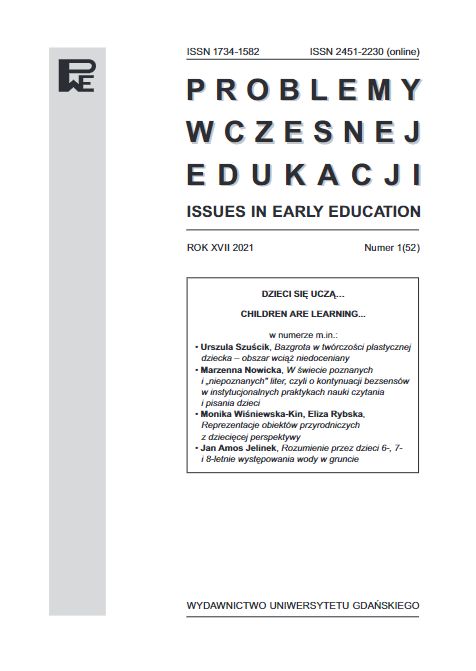Preparing teachers of Early Childhood Education to teach a foreign language: the PEPELINO portfolio in practice
DOI:
https://doi.org/10.26881/pwe.2021.52.11Keywords:
language teaching, very young learners, language policy, PEPELINO portfolioAbstract
Teaching a foreign language at pre-primary level has been officially introduced in Poland in 2015 as a follow-up to European policy guidelines (European Commission 2011b). Teachers are agents of any language policy as it is them who have to warrant its implementation through pedagogical practice. While most of the studies conducted on policy implementation focus on teacher beliefs and multilingual practices (e.g., Haukås 2016; Lundberg 2019), the following paper concentrates on implementing European language policy guidelines in respect of early foreign language education and pluralistic approaches. It describes a quantitative study of early education in-service teachers who attended a 3-semester preparation course for language teaching. The data analysis revealed that ‘supporting the linguistic development of children with other first languages than Polish’ gained the least support among the respondents, despite a significant course module devoted to this issue. Therefore, the conclusion can be drawn that the teachers will be able to raise interest in language learning by very young learners, by drawing on their experience as Early Childhood Educators, yet it will be difficult to foster plurilingualism and attitudes of intercultural interest by teachers who often lack intercultural experience and plurilingual awareness themselves.
Downloads
References
Abasifar S., Fotovatnia Z. (2015), Impact of teacher training course on Iranian EFL teachers’ beliefs. “International Journal of Foreign Language Teaching & Research”, 3(9).
Altman C., Goldstein T., Armon-Lotem S. (2018), Vocabulary, Metalinguistic Awareness and Language Dominance Among Bilingual Preschool Children. “Frontiers in Psychology”, 23 October 2018, https://doi.org/10.3389/fpsyg.2018.01953, 15.09.2020.
Bialystok E., Peets K.F., Moreno S. (2014), Producing bilinguals through immersion education: Development of metalinguistic awareness. “Applied. Psycholinguistics”, 35.
Bustos Flores B. (2001), Bilingual Education Teachers’ Beliefs and Their Relation to Self-Reported Practices. “Bilingual Research Journal”, 25. DOI: 10.1080/15235882.2001.10162795.
Byram M. (1997), Teaching and Assessing Intercultural Communicative Competence. Clevedon, Multilingual Matters.
Christison M.A., Krulatz A., Sevinç Y. (2021), Working with Teachers and Young learners in Multilingual Classrooms: Introducing the Multilingual Approach to Diversity in Education (MADE). In: J. Rokita-Jaśkow, A. Wolanin (eds.), Facing diversity in child foreign language education. Cham, Springer.
Council of Europe (2001). The Common European framework of reference for languages: Learning, teaching and assessment. Cambridge: Cambridge University Press. http://www.coe.int/t/dgg/ linguistic/source/manual/revision-proofread-final_en.pdf, 2.08.2021.
Cregan A. (2019), Promoting Oral Language Development in the Primary School. Dublin, The National Council for Curriculum and Assessment (NCCA).
De Angelis G. (2011), Teachers’ beliefs about the role of prior language knowledge in learning and how these influence teaching practices. “International Journal of Multilingualism”, 8, DOI: 10.1080/14790718.2011.560669.
Enever J. (2018), Policy and Politics in Global Primary English. Oxford, Oxford University Press.
European Commission (1995), White Paper: Teaching and Learning-Towards the Learning Society, https://op.europa.eu/en/publication-detail/-/publication/d0a8aa7a-5311-4eee-904c98fa541108d8/language-en, 15.09.2020.
European Commission (2011a), Early Language Learning at Pre-Primary Level in Europe: Current Situation and Future Perspectives http://ec.europa.eu/dgs/education_culture/repository/ languages/policy/language-policy/documents/ellphb-summaries_en.pdf, 12.07.2017.
European Commission (2011b), Language learning at pre-primary school level: making it efficient and sustainable. Policy Handbook, http://ec.europa.eu/dgs/education_culture/repository/languages/policy/language-policy/documents/early-language-learning-handbook_en.pdf, 12.07.2017.
European Commission (2017), Key Data on Teaching Languages at school in Europe, https://eacea. ec.europa.eu/national-policies/eurydice/content/key-data-teaching-languages-school-europe- %E2%80%93-2017-edition_en, 15.09.2020.
Fojkar D.M., Skubic D. (2017), Pre-Service Preschool Teachers’ Beliefs about Foreign Language Learning and Early Foreign Language Teaching in Slovenia. “CEPS Journal”, 7.
Goullier F., Carré-Karlinger C., Orlova N., Roussi M. (2015), European language portfolio for preprimary educators. The plurilingual and intercultural dimension. European Centre for Modern Languages, Council of Europe, https://www.ecml.at/Portals/1/mtp4/pepelino/pepelino-EN-web. pdf, 15.09.2020.
Haukås Å. (2016), Teachers’ beliefs about multilingualism and a multilingual pedagogical approach. “International Journal of Multilingualism”, 13. DOI: 10.1080/14790718.2015.1041960.
Karavas E., Drossou M. (2010), How amenable are student teacher beliefs to change? A study of EFL student teacher beliefs before and after teaching practice. In: A. Psaltou-Joycey, M. Matheoudakis (eds.), Advances in Research on Language Acquisition and Teaching: Selected Papers. Thessaloniki, Greek Applied Linguistic Association.
Kirsch C. (2018), Dynamic interplay of language policies, beliefs and pedagogy in a preschool in Luxembourg. “Language and Education”, 32. DOI: 10.1080/09500782.2018.1487452.
Lundberg A. (2019), Teachers’ beliefs about multilingualism: findings from Q method research. “Current Issues in Language Planning”, 20. DOI: 10.1080/14664208.2018.1495373.
Ministry of Polish Education (2014), Regulation on the Core Curriculum for Kindergarten and general Education. Dziennik Ustaw [Journal of Laws] z 2014 r., poz.803, http://isap.sejm.gov. pl/DetailsServlet?id=WDU20140000803, 12.10.2020.
Ministry of Polish Education (2017), Regulationon the New Core Curriculum for Kindergarten and General Education in Primary school. Dziennik Ustaw [Journal of Laws] z 2017 r., poz.356. http://www.dziennikustaw.gov.pl/DU/2017/356, 12.10.2020.
Murphy V., Evangelou M. (eds.) (2016), Early Childhood education in English for Speakers of Other Languages. London, British Council.
Newby D., Allan R., Fenner A-B., Jones B., Komorowska H., Soghikyan K. (2007), The European Portfolio for Student-Teachers of Languages. Graz, ECML. Otwinowska A. (2017), English teachers’ language awareness: Away with the monolingual bias? “Language Awareness”, 26(4).
Pajares M.F. (1992), Teachers’ beliefs and educational research: Cleaning up a messy construct. “Review of Educational Research”, 62(3).
Portolés L., Martí O. (2018), Teachers’ beliefs about multilingual pedagogies and the role of initial training. “International Journal of Multilingualism”, 17(2).
Rokita-Jaśkow J. (2016), Kindergarten teachers’ beliefs about the goals of very early FL instruction and their classroom practices: is there a link? In: M. Pawlak (ed.), Classroom-Oriented Research, Second Language Learning and Teaching, Heidelberg – New York, Springer. DOI 10.1007/978-3-319-30373-4.
Rokita-Jaśkow J., Pamuła-Behrens M. (2019), Policy and practice in early FLL: the case of Poland. In: J. Rokita-Jaśkow, M. Ellis. (eds.), Early instructed SLA: Pathways to competence. Bristol, Multilingual Matters.

 Academic Scientific Journals
Academic Scientific Journals





